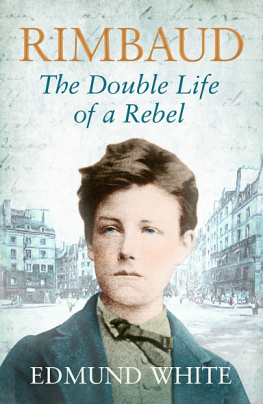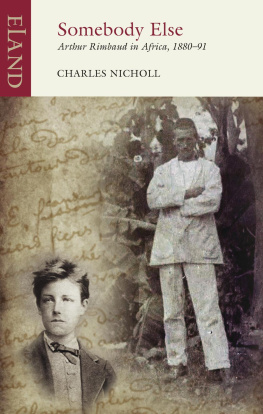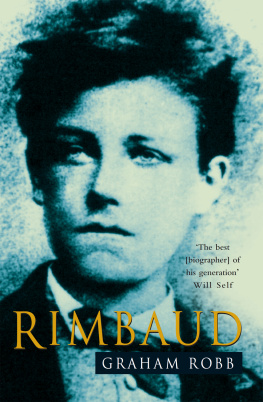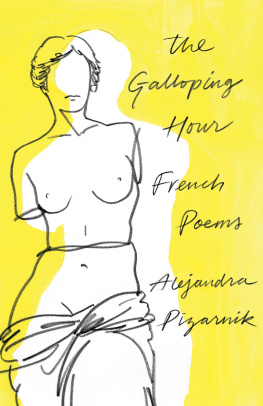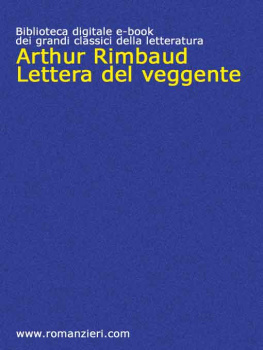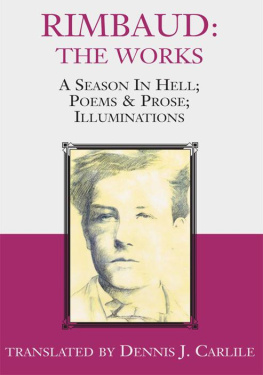
SELECTED POEMS AND LETTERS
ARTHUR RIMBAUD was born in Charleville in 1854. From an early age he wrote poems and stories, and excelled at Latin verse. In adolescence he developed a hatred for provincial life, fleeing to Paris in 1870, during the Franco-Prussian War, and again in 1871 at the time of the Commune. His poetry was a rigorous search for the unknown based on a reasoned disordering of all the senses by means of alcohol and drugs. His relationship with Paul Verlaine led him to London, where the couple drank away their modest resources and Rimbaud reinvented the city in his prose-poems, the Illuminations (1886), which with A Season in Hell (1873) are regarded as his highest achievements, but the poems in verse, which include Le Bateau ivre, are among the most famous in nineteenth-century European literature. At the age of twenty, Rimbaud was done with poetry. He embarked on a new life, signing up as a mercenary in the Dutch East Indies, a clerk in a travelling circus and then as a quarry foreman in Cyprus. In 1880 he set up as a trader in what is now Ethiopia. He spent the remainder of his life as a dealer in coffee, hides, weapons and ivory. He was an able explorer and linguist, and a prolific letter writer. He died in 1891 at the age of thirty-seven.
JEREMY HARDING is a contributing editor at the London Review of Books, and the translator of Modern French Philosophy by Vincent Descombes. He is the author of Small Wars, Small Mercies, an account of the liberation struggles in Africa, where he worked as a journalist in the 1980s and 1990s, and The Uninvited, which tracks the movement of refugees and clandestine migrants into Western Europe since the end of the Cold War.
JOHN STURROCK was educated at the universities of Oxford and Sussex. He was Deputy Editor of The Times Literary Supplement from 1972 to 1984 and is now Consulting Editor of the London Review of Books. He has published critical books on the French New Novel, Borges, autobiography and Structuralism, and translated Victor Hugo, Stendhal and Marcel Proust for Penguin Classics.
ARTHUR RIMBAUD
Selected Poems and Letters
Translated and with an Introduction and Notes by
JEREMY HARDING and JOHN STURROCK
PENGUIN BOOKS
PENGUIN BOOKS
Published by the Penguin Group
Penguin Books Ltd, 80 Strand, London WC2R 0RL , England
Penguin Group (USA) Inc., 375 Hudson Street, New York, New York 10014, USA
Penguin Books Australia Ltd, 250 Camberwell Road, Camberwell, Victoria 3124, Australia
Penguin Books Canada Ltd, 10 Alcorn Avenue, Toronto, Ontario, Canada M4V 3B2
Penguin Books India (P) Ltd, 11, Community Centre, Panchsheel Park, New Delhi 110 017, India
Penguin Books (NZ) Ltd, Cnr Airborne and Rosedale Roads, Albany, Auckland 1310, New Zealand
Penguin Books (South Africa) (Pty) Ltd, 24 Sturdee Avenue, Rosebank 2196, South Africa
Penguin Books Ltd, Registered Offices: 80 Strand, London WC2R 0RL , England
www.penguin.com
First published 2004
Translation, Introduction and Notes copyright Jeremy Harding and John Sturrock, 2004
All rights reserved
The moral right of the translators has been asserted
Except in the United States of America, this book is sold subject to the condition that it shall not, by way of trade or otherwise, be lent, re-sold, hired out, or otherwise circulated without the publisher's prior consent in any form of binding or cover other than that in which it is published and without a similar condition including this condition being imposed on the subsequent purchaser
ISBN: 978-0-14-193234-7
Contents
Acknowledgements
Jeremy Harding wishes to thank James Ozanne, Tim Curtis and Martin Thom for pointing the way to Rimbaud; Robert de Does, Andr Guyaux, Michel Murat and Lorna Scott Fox for their invaluable advice on some of the difficulties in the text; and Patrick and Genevive Ral for their generous support. John Sturrock is grateful to Andr Guyaux for help on a number of points in the correspondence, and to Dr Richard Pankhurst, doyen of British Ethiopianists, who was able to explain numerous otherwise obscure references to local names, Amharic terms and events in Abyssinia in the 1880s.
A Note on the Translation
Translators of poetry owe a lot to their predecessors. Oliver Bernard brought Rimbaud to a wide English readership with his Penguin edition of 1962, which this one supersedes. There are a number of differences. It is now widely accepted that A Season in Hell predates many of the Illuminations, and so in this edition, A Season in Hell no longer appears at the end. I have also included The Deserts of Love, which was not in Bernard's volume. There have been other, lesser changes in ordering, and some of the poems have been retitled, or titled, in line with recent textual scholarship.
The parallel text has been adopted in preference to the prose translation at the foot of the page a choice that could be said to cramp a translator's style rather more than a prose version does. But I am convinced it is more manageable for the reader. It's easier, after all, to run one's eye from version to original when the lines are juxtaposed in the verse, or more or less level in the prose-poems, than it is to move from a chunk of prose to a piece of verse, or to another piece of prose in a different type size.
This, in turn, makes it easier for readers to spot where a liberty has been taken in translation. To leave off a question mark in the French (as I've done with the last line of Memory) because something more desolate than a question seems to get the truth of the poem in English, and catch the right inflection, is to take a liberty. To update Rimbaud's idiomatic mode assuredly not his only mode by converting to current usage (as I've done with Knowing Way) is to take a greater liberty still. Often a loyal translation is nearer the mark than a faithful one. Not all readers will agree, but the parallel text format will help them to make their own judgements.
These translations do not attempt to track the syllable count of the French. Instead I've tried to work with rhythms that sound well on an English ear. Rhyme is also avoided, except in a handful of cases where it has insinuated itself into a version and gone on, through a number of drafts, to make itself at home. Here and there, an obscurity in the original has seemed to need an intrusion in the English. In a few of the explanatory notes, too, I've erred on the side of generosity. To the Poet on the Matter of Flowers, for example, requires rather more of translators and editors than an august silence.
The decision to select from Rimbaud's literary work was taken in order to make room for a good many of the letters he wrote after he had finished with poetry. But selecting cannot be done without a lot of head-shaking and hair-tearing. A Season in Hell stands entire the only straightforward decision. Despite a dozen or more regrets, I'd like to think that this is a representative sample of the poetry.
The job of translating is made much easier by the existence of good editions in the original. The source for John Sturrock's translations is Antoine Adam's Pliade edition of 1972, which remains authoritative with regard to the letters. The poems selected here were translated while Andr Guyaux was preparing a new edition of the Pliade, and so the principal source for the poetry has been the Gamier euvres edited by Suzanne Bernard and Andr Guyaux. In the notes, I have drawn extensively on Bernard and Guyaux, and on the three-volume
Next page

